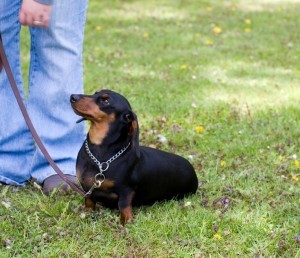
1. Make the most of the first few days – they are crucial
It might be tempting to let your little ball of joy run free in the early days, but it’s crucial that you don’t.
Setting down early ground rules will set the tone and stop a lot of problems further down the line.
If you start out letting them do whatever they want, it’ll be much harder to stop them from doing it when they’re a bit older.
After all, it was fine the first few times.
Instead, make sure you know how you want your pet to behave, and teach them very early on what they can and cannot do.
Every interaction with your puppy is a training opportunity – and the early ones are where the foundations are built.
The precedents you set now will last a lifetime.
2. Security and routine is everything to a puppy
When you take your puppy home, it’s worth remembering that he or she has just been taken away from their mum and litter mates.
They’re in a strange environment and it can be a stressful time.
You’re over the moon – you’ve got the puppy you’ve always dreamed of.
And your new dog is probably on form too, if you’re showing him or her enough attention.
But it’s important to make sure they feel safe, and a good way of doing that is setting out fixed routines.
You always know where you are with a routine, and so will your pet.
That includes their feeding, sleeping and walking.
It also means your routine too.
If he or she is going to be alone during the day or night, they need to start getting used to it now.
If your pup wake up from a nap and whines, resist the urge to run in and comfort them.
3. Teach them instruction from the start
As puppies learn quickly and benefit from routine, it’s also important that you use commands early.
Puppies are like children – they absorb a lot of information early on.
If you teach them instructions from the start, they will follow them forever.
So get used to saying ‘sit’, ‘fetch’ and ‘heel’ – and expect them to obey.
4. Get the whole family on board
If you’re going to start a routine and give your puppy set instructions, it’s crucial that the rest of the family knows the plan too.
There’s no point in you feeding, walking and playing with your dog at certain times, only for someone else in the family to interrupt the times in between with a treat here and there.
At the start, everyone wants to play, pet and feed the puppy.
But it will do nothing for your dog in the long run.
So have a family meeting and discuss what your plans are.
Your family members might have good suggestions you haven’t considered, and at the very least they will know what you’re trying to do and how they can help.
5. Set a schedule and stick to it
If your family pet is a shared responsibility, then there should be a share in the responsibility.
Set up a schedule of who is to walk, feed and clean up after the puppy so that everyone knows whose job it is.
It will stop a lot of arguments, and also help bed in that sense of routine.
6. Help them learn how they feel
Play gently and quietly with your new pet – don’t flood them with attention and activity.
It’s tempting to want to do everything at once, especially in the first few days, but it’s important you consider their needs.
If your puppy looks sleepy, leave them alone and let them rest.
Puppies are like babies – they don’t know everything from day one!
And they need a lot of sleep.
7. Keep your puppy away from bad influences
This sounds a bit over the top – your puppy isn’t a teenage boy!
But it is important that you’re aware of any naughty bad influencers around.
The only way you can instruct your puppy is to be there.
If you can’t be there, don’t allow them to have access to people or places where he or she can get into trouble.
8. Don’t punish your puppy with harsh treatment – but do praise them enthusiastically for the good
It’s really important that if your puppy misbehaves, it’s not intentional.
They are only doing what comes naturally, and they need to learn that what they have done is wrong.
However, the way to do this is not with harsh reprimands.
Instead, show your pet the behaviour you want to see from them.
If pup chews the couch, firmly telling them ‘no’ or ‘off’ should be followed by giving him or her one of their toys and encouraging them to play and chew that instead.
And the important bit – praise them enthusiastically when they do so.
9. Get your vet involved early
Schedule an appointment with the vet as early as possible.
You should have your puppy vaccinated before you start to take them on walks, so get that out of the way as soon as possible.
A healthy body is vital for a puppy’s well-being and mental health.
Keeping them fit and healthy will make your puppy a joy to be around, and it’s up to you to get the ball rolling.
10. Get them social
Puppy socialisation classes give your puppy an excellent opportunity to meet a variety of people and dogs in a safe and controlled setting.
It gives them the chance to play with other dogs, which will make taking them out for walks much easier in future.
It’s also a good way for you as an owner to pick up some extra tips.

Enjoy the convenience of having The Sunday Post delivered as a digital ePaper straight to your smartphone, tablet or computer.
Subscribe for only £5.49 a month and enjoy all the benefits of the printed paper as a digital replica.
Subscribe








